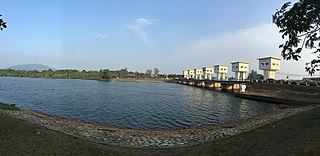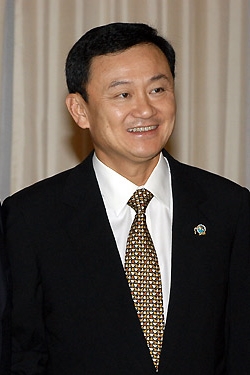
The Politics of Thailand are conducted within the framework of a constitutional monarchy, whereby the prime minister is the head of government and a hereditary monarch is head of state. The judiciary is independent of the executive and the legislative branches.

Narathiwat is one of the southern provinces (changwat) of Thailand. Neighboring provinces are Yala and Pattani. To the south it borders the Malaysian state of Kelantan and Perak. The southern railway line ends in this province, which is one of the nation's four provinces that border Malaysia. The province features a range of cultures as well as natural resources, and is relatively fertile. Narathiwat is about 1,140 kilometers south of Bangkok and has an area of 4,475 km2 (1,728 sq mi). Seventy-five percent of the area is jungle and mountains and has a tropical climate.

Thaksin Shinawatra is a Thai businessman and politician. He served in the Thai Police from 1973 to 1987, and was the Prime Minister of Thailand from 2001 to 2006.
Narathiwat is a town in southern Thailand and capital of Narathiwat Province. The town is in the Mueang Narathiwat District and was established in 1936. As of 2008, the population was 40,521. It lies 1,141 km south of Bangkok.

General elections were held in Thailand on 6 February 2005. The result was a landslide victory for the Thai Rak Thai party of Prime Minister Thaksin Shinawatra, which won 377 of the 500 seats in the House of Representatives, with its former coalition partner, the Chart Thai Party taking 25 seats. The opposition Democrat Party of Thailand won only 96 seats and the newly formed Mahachon Party took two seats.

The South Thailand insurgency is an ongoing conflict centered in southern Thailand. It originated in 1948 as an ethnic and religious separatist insurgency in the historical Malay Patani Region, made up of the three southernmost provinces of Thailand and parts of a fourth, but has become more complex and increasingly violent since the early 2000s from drug cartels, oil smuggling networks, and sometimes pirate raids.
Human rights in Thailand have long been a contentious issue. The country was among the first to sign the UN's Universal Declaration of Human Rights of 1948 and seemed committed to upholding its stipulations; in practice, however, those in power have often abused the human rights of the Thai nation with impunity. From 1977 to 1988, Amnesty International (AI) reported that there were whitewashed cases of more than one thousand alleged arbitrary detentions, fifty forced disappearances, and at least one hundred instances of torture and extrajudicial killings. In the years since then, AI demonstrated that little had changed, and Thailand's overall human rights record remained problematic. A 2019 HRW report expanded on AI's overview as it focuses specifically on the case of Thailand, as the newly government of Prime Minister Prayut Chan-o-cha assumes power in mid-2019, Thailand's human rights record shows no signs of change.
In 2005 and 2006, a series of events occurred in Thailand as a result of public anger with Prime Minister Thaksin Shinawatra that was supported by Sondhi Limthongkul and his coalitions. It led a military coup that concluded in the overthrow of the Thai Rak Thai government in September 2006, the flight of Thaksin after the court verdict, and the establishment of the junta government led by Surayud Chulanont, a favourite of privy councillor and senior statesman Prem Tinsulanonda.
Tak Bai is the capital of Tak Bai District, Narathiwat Province, Thailand. It is situated on the western bank of the Golok River estuary, which is the natural international boundary between Thailand and Malaysia. Visitors can enter Malaysia via Pengkalan Kubor, Kelantan with a ferry service.
Pallop Pinmanee (Thai: พัลลภ ปิ่นมณี,RTGS: Phanlop Pinmani, born 25 May 1936 in Sam Phran, Nakhon Pathom as Amnat Pinmanee is a retired Thai Army general who took part in several coups, ordered the massacre of insurgents at Krue Sae Mosque and allegedly played a role in the attempted car-bomb assassination of Prime Minister Thaksin Shinawatra. After a 2006 military coup overthrew Thaksin, the military junta appointed Pallop public relations adviser to the Internal Security Operations Command of Thailand. He eventually switched sides and became an adviser to Thaksin's younger sister Yingluck Shinawatra while she was serving as prime minister.

Tak Bai is a district (amphoe) in the southeastern part of Narathiwat province, southern Thailand.

Anti-Malay sentiment or Malayophobia refers to feelings of hostility, prejudice, discrimination or disdain towards Malay people, Malay culture, the Malay language or anything perceived as Malay.
Somchai Neelapaijit, a Thai Muslim lawyer and human rights activist who "disappeared" 12 March 2004 during Thaksin Shinawatra's regime. On that date, Somchai was last seen in Ramkhamhaeng where eyewitnesses saw four men dragging him from his car. He has not been seen since.

Thaksin Shinawatra was the 23rd prime minister of Thailand.

Angkhana Neelaphaijit, née Angkhana Wongrachen, is a Thai human rights activist, former member of the National Human Rights Commission, and the wife of disappeared human rights lawyer Somchai Neelaphaijit. Amnesty International described her as "a leading human rights defender in Southern Thailand".

The 2013–2014 Thai political crisis was a period of political instability in Thailand. Anti-government protests took place between November 2013 and May 2014, organised by the People's Democratic Reform Committee (PDRC), a political pressure group led by former Democrat Party parliamentary representative (MP) Suthep Thaugsuban. The crisis eventually resulted in the removal of incumbent Prime Minister Yingluck Shinawatra, a coup d'état, and the establishment of a military junta.

The history of Thailand since 2001 has been dominated by the politics surrounding the rise and fall from power of former Prime Minister Thaksin Shinawatra, and subsequent conflicts, first between his supporters and opponents, then over the rising military influence in politics. Thaksin and his Thai Rak Thai Party came to power in 2001 and became very popular among the electorate, especially rural voters. Opponents, however, criticized his authoritarian style and accused him of corruption. Thaksin was deposed in a coup d'état in 2006, and Thailand became embroiled in continuing rounds of political crisis involving elections won by Thaksin's supporters, massive anti-government protests by multiple factions, removals of prime ministers and disbanding of political parties by the judiciary, and two military coups.
The year 2004 was the 223rd year of the Rattanakosin Kingdom of Thailand. It was the 59th year in the reign of King Bhumibol Adulyadej, and is reckoned as year 2547 in the Buddhist Era.
This article lists a chronology of events in the South Thailand insurgency from the 1960s. Most take place in the Muslim-majority, contested provinces of Narathiwat, Pattani, and Yala in the far south of Thailand bordering Muslim Malaysia.











